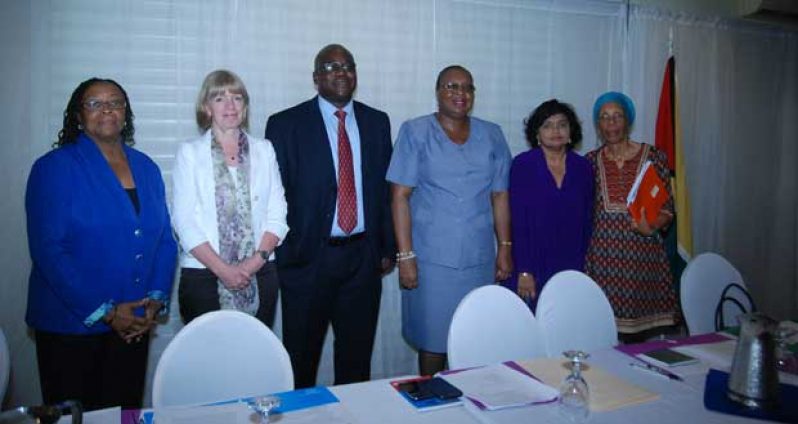THE Education Ministry yesterday hosted a forum on Health and Family Life Education (HFLE) at Parc Rayne, Rahaman’s Park, Greater Georgetown in a collaborative effort with the United Nations Children’s Fund (UNICEF).
The two-day review and planning forum facilitated a stakeholder’s discussion on the findings of a recent evaluation conducted on the HFLE programme, and will host a range of group work, revision of the project, group reports, oral evaluations, presentations, and other activities which would review the progress achieved thus far, and roll out future plans for the project.
The event is being held under the theme “Revisiting Health and Family Life Education in Guyana: A comprehensive approach to children’s success in the 21st century.”

The Ministry of Education says that Health and Family Life Education is an important aspect that is essential for development of Guyanese Society.
Elaborating on the Ministry’s role in the HFLE, Chief Education Officer Olato Sam stressed that the aim of the programme was and is to focus on developmental health strategies in fostering a more health educated population.
He noted that activities of the HFLE were initiated mainly by the Ministry of Health, but were later transferred to the Ministry of Education. Sam explained that training and research materials were developed between 2000 and 2005; and that through testing, the Education Ministry was able to identify challenges, after which avenues were sought to combat them.
One of the main challenges encountered was that teachers felt uncomfortable discussing certain topics with children, he said.
In 2010, through the Ministry’s efforts, HFLE as a timetabled subject was implemented in 30 schools, followed by an additional 40 schools in 2011. By the end of 2012, HFLE was already part of the curriculum of 98 schools.
Sam said that the programme is presently engineered in 117 school systems across the country, and the Ministry is aiming to have the programme integrated in all schools across the country, so as to provide children with training and education in health and sex education.
“It is expected that, with a little more work, the programme will be implemented in all grades at the primary and secondary levels,” Sam revealed.
The CEO also revealed that improvements in school life for children have also been manifested through HFLE training in health, sex health education, and anger management programmes. He thanked UNICEF for the integral role that body has played in the HFLE programme, and noted that HFLE is a vehicle through which critical life skills are transmitted.
“Children will become more productive if HFLE impacts them”, he concluded.
UNICEF Representative to Guyana and Suriname, Ms Marianne Flach, stressed in brief remarks the need for discussion of social issues enveloping the society, so as to strengthen health and family life, and impact children positively.
She noted that social, educational, and reflective skills are vitally important not only for development within the home, but the community as a whole. “Life skills programmes help children to think critically,” she declared.
Flach maintained that children do not see the importance of acquiring education, and fail to recognize the adverse effects of some of their actions. She said that teenage pregnancy particularly is one such issue where, through education, young teens can know the difficulties which they should be prepared to encounter, and as such, the training provides training and learning materials for them.
She said that UNICEF is proud to participate in this initiative, and would continue to support the Education Ministry and other agencies in this and other developmental projects.
Life skills training and education through UNICEF have been formally implemented in 145 countries’ schools’ curriculum worldwide, and in 11 other countries informally.
(By Ravin Singh)



.jpg)









